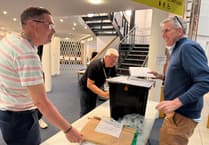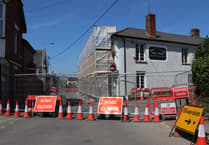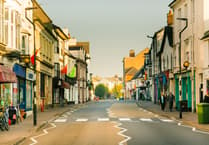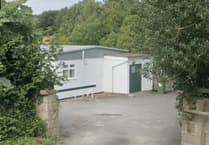THIS week, the latest IPCC (the UN’s Intergovernmental Panel on Climate Change) report was released.
The message is clearer than ever: we need a transformation in how we power our world, and we need to end the age of fossil fuels quickly and fairly.
Without rapid and deep emissions cuts across all sectors, overshooting the agreed limit of 1.5degrees of warming is “almost inevitable” as the report says.
There are options that can cut our emissions by at least half by 2030, which is needed to avoid the worst impacts of climate change. And thankfully, the costs of wind, solar and battery technology have come down 85 per cent during the last 10 years.
Recently, my motion asking Mid Devon District Council to support the Local Electricity Bill passed.
The Bill, if it passed, would remove the huge costs to communities that want to generate, store and sell electricity locally. Local energy resilience is an important part of changing how we power our lives.
My background is in international development, and some of the things I have worked on or alongside – healthy nature, healthy communities, no poverty – are unobtainable if we don’t address climate change.
Climate change is already undermining decades of progress in these areas.
If we have the tools and knowledge we need to create health and resilient communities, what are the barriers? - flow of finance and political will are two of the big ones.
The report makes clear that individual choices alone make only a modest contribution to emission reductions.
Individual and collective action is made possible by things like better planning and building standards, better vehicle efficiency, and low carbon infrastructure.
To make these things reality, we need brave political change, not primarily consumer behaviours.
Sadly, our reckless government talks of abandoning our “phobia of hydrocarbons” and opening up new North Sea oil and gas drilling.
It can take decades for a new oil field to open; it won’t solve the energy crisis, the cost of living crisis, or the climate crisis.
It’s a sorry excuse to protect fossil fuel interests. This is not brave leadership; it’s the government failing its duty to keep its citizens safe.
Tackling climate change – locally, nationally, globally – has been delayed because of perceived high-cost implications.
Investment in the shift to a low-carbon world is about six times lower than it needs to be. But the financial toll of climate disasters is steadily climbing.
The IPCC says there is far too much money still flowing towards fossil fuels and not to clean energy climate solutions. The UK has one of the most generous tax regimes in the world for oil companies.
The UN secretary general, António Guterres, said some governments and businesses were “lying” in claiming to be on track for 1.5C.
In his rebuke, he warned: “Some government and business leaders are saying one thing – but doing another. Simply put, they are lying. And the results will be catastrophic.”
The report found that growing forests and preserving soils will be necessary, but tree-planting cannot do enough to compensate for continued emissions for fossil fuels.
Tree planting is of course important for biodiversity and soil health, and should be welcomed, but it is an easy and media-friendly thing for politicians to do – just like it is easy for international corporations to buy up land they’ve never stepped foot on and use it for tree planting to “offset” their emissions; to continue business as usual.
We need brave leadership, not photogenic greenwashing.
There is such opportunity right now to tackle the energy crisis, the cost of living crisis and the climate crisis at the same time.
We need good leadership, wisdom, and long-term thinking to transform this opportunity into reality.
Author and scientist Isaac Asimov said: “The saddest aspect of life right now is that science gathers knowledge faster than society gathers wisdom.”
As I read the latest gathering of knowledge in the IPCC report, I pray for an equal gathering of wisdom, which is available in abundance if we choose to look and listen in the right places.
Cllr Elizabeth Lloyd (née Wainwright)
Sandford and Creedy Ward
Mid Devon District Council





Comments
This article has no comments yet. Be the first to leave a comment.